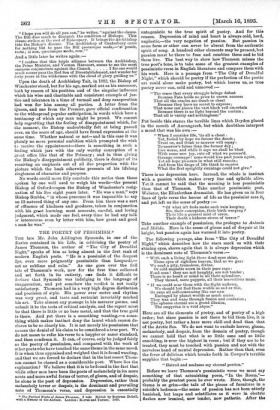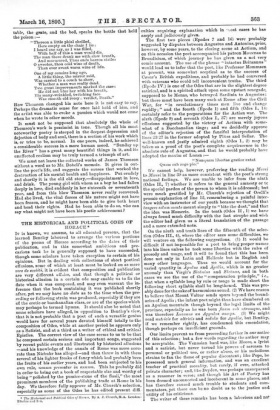THE POETRY OF PESSIMISM.* THE late Mr. John Addington Symonds,
in one of the diaries contained in his Life, in criticising the poetry of James Thomson, the author of "The City of Dreadful Night," speaks of him as being almost in the first rank of modern English poets. "He is a pessimist of the deepest
dye, even more poignantly pessimistic than Leopards,—
not so sublime and calm." As one goes over the full tale of Thomson's work, now for the first time collected and set forth in its entirety, Gas finds it difficult to declare that Symonds was indulging in the language of exaggeration, and yet somehow the verdict is not really satisfactory. Thomson had in a very high degree distinction and precision of style. His power over metre and rhythm was very great, and taste and restraint invariably marked his art. Take almost any passage in his maturer poems, and submit it to the tests of critical analysis, and the report must be that there is little or no base metal, and that the true gold is there. And yet there is a something wanting,—a some- thing which makes instinct deny the laurel which reason de- clares to be so clearly his. It is not merely his pessimism that causes the denial of his claim to be considered a true poet. We do not mean to refer his verse to a happier or saner standard, and then condemn it. It can, of course, only be judged fairly as the poetry of pessimism, and compared with the work of other poets who have touched the same theme in the same mood. It is when thus appraised and weighed that it is found wanting, and that we are forced to declare that in the last resort Thom- son cannot be classed as a considerable poet. Where lies the explanation ? We believe that it is to be found in the fact that while other men have been the poets of melancholy in its more acute and more awful forms of terror, of gloom, and of despair, he alone is the poet of depression. Depression, rather than melancholy terror or despair, is the dominant and prevailing note of Thomson's verse, and depression is essentially
• The Poetical Works of James Thomson. 2 vela Edited by Bertram Dube', with a Memoir of the Author. Loudon: &eves and Turner. 1b95.
antagonistic to the true spirit of poetry. And for this reason. Depression of mind and heart is always cold, hard, unplastic,—the very negation of passion. But passion in some form or other can never be absent from the authentic spirit of song. A hundred other elements may be present, but passion must be there to fuse and combine them and to bid them live. The best way to show how Thomson misses the true poet's tone, is to take some of the greatest examples of pessimistic verse in English literature and compare them with
his work. Here is a passage from "The City of Dreadful Night," which should be poetry if the perfection of the poetic
art could alone make poetry, but which leaves us, as true poetry never can, cold and unmoved :—
" The sense that every struggle brings defeat
Because Fate holds no prize to crown success That all the oracles are dumb or cheat Because they have no secret to express ; That none can pierce the vast black veil uncertain Because there is no light beyond the curtain ; That all is vanity and nothingness."
Put beside this stanza the terrible lines which Dryden placed in the mouth of Aurungzeeb, but which doubtless interpret a mood that was his own :—
" When I consider life, 'tis all a cheat : Yet, fooled by hope we favour the deceit ; Trust on, and think to morrow will repay : To-morrow's falser than the former day; Lies worse, and while it says we shall be blest With some new joy, cuts off what we possess'd. Strange cosenage I none would live past years again.
Yet all hope pleasure in what still remain; And from the dregs of life think to receive What the first sprightly runnings could not give."
There is no depression here. Instead, the whole is instinct with a passion which makes every line and syllable alive. Yet it cannot be said that the meaning is less pessimistic
than that of Thomson. Take another pessimistic poet, Webster, the Elizabethan dramatist. He has given us in four lines of lyric verse the horror of life as the pessimist sees it, and yet left us the sense of poetry :—
" Of what is't fools make such vain keeping, Sin, their conception, their birth weeping Their life a general mist of error,
Their death a hideous storm of terror."
Take another example of pessimism, the prologue to Antonio and Melida. Here is the sense of gloom and of despair at its height, but passion again has warmed it into poetry.
The following passage, also from "The City of Dreadful Night," which describes how the stars mock us with their shining eyes, shows again that it is always depression which is the dominant note of Thomson's verse :—
" With such a living light these dead eyes shine,
These eyes of sightless heaven, that as we gaz..; We read a pity, tremulous, divine, Or cold majestic scorn in their pure rays : Fend man ! they are not haughty, are not tender ; There is no heart or mind in all their splendour, They thread, mere puppets, all their marvellous maze.
" If we could near them with the flight unfiown, We should but find them worlds as sad as this, Or suns all self-consuming like our own Enringed by planet worlds as much amiss : They wax and wane through fusion and confusion ; The spheres eternal are a grand illusion, The empyrCan is a void abyss."
Here are all the elements of poetry, and of poetry of a high order; but since passion is not there to bid them live, it is not poetry, but rather a haze more chill and dead than that of the Arctic Sea. We do not want to exclude horror, gloom, melancholy, and despair, from the domain of poetry, though we cannot hold that what is so little sane and so little ennobling, is ever the highest in verse ; but if they are to be treated, they must be touched with passion and not with the nerveless hand of mental depression. Rather than that, even the fever of delirium which breaks forth in Cowper's terrible sapphics that begin :—
" Hatred and madness my eternal portion."
Before we leave Thomson's pessimistic verse we must say something of that astonishing poem, "In the Room,"— probably the greatest poem he ever wrote. Here, though, the theme is so grim—the talk of the pieces of furniture in a suicide's bedroom—the sense of passion has not been utterly banished, but leaps and scintillates as it were in electric
flashes now ironical, now tender, now pathetic. After the
table, the grate, and the bed, speaks the bottle that held the poison :—
" Thereon a little phial shrilled,
Here empty on the chair I lie : I heard one say, as I was filled, With half of this a man would die.
The man there drank me with slow breath, And murmured, Thus ends barren strife: 0 sweeter, thou cold wine of death, Than ever sweet warm wine of life.
One of ray cousins long ago, A little thing, the mirror said, Was carried to a couch to show, Whether a man was really dead.
Two great improvements marked the case:
He did not blur her with his breath, His many-wrinkled, twitching face Was smooth old ivory : verdict, Death."
How Thomson changed his note here it is not easy to say. Perhaps the dramatic sense for once laid hold of him, and the artist was able to evoke a passion which would not come when he wrote in other moods.
It must not be supposed that absolutely the whole of Thomson's work is pessimist in tone. Though all his most noteworthy poetry is steeped in the deepest depression and dejection of body and soul, there is a section of his work which is, or tries to be, normal. In one poem, indeed, he achieved a considerable success in a more human mood. "Sunday up the River" has a great many beautiful things in it, and its unaffected realism may be truly termed a triumph of art.
We must not leave the collected works of James Thomson without a word as to Mr. Dobell's memoir. It gives in out- line the poet's life, and suggests the causes that worked the destruction of his mental health and happiness. Put crudely and shortly it is the old old story,—disappointment in love, and drink. The young girl with whom as a boy he had fallen deeply in love, died suddenly in her sixteenth or seventeenth year, and from this blow Thomson never_ really recovered. Had she lived, the vital forces of his nature might not have been frozen, and he might have been able to give both heart and head their rights. Had he been able to do so, who can say what might not have been his poetic achievement?



































 Previous page
Previous page